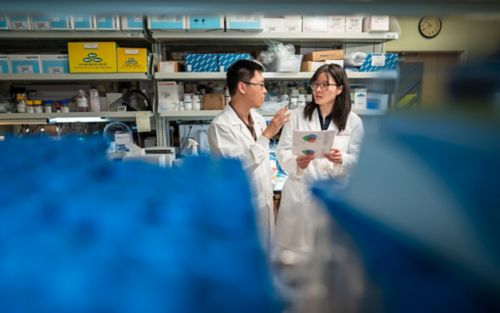St. Jude Family of Websites
Explore our cutting edge research, world-class patient care, career opportunities and more.
St. Jude Children's Research Hospital Home

- Fundraising
St. Jude Family of Websites
Explore our cutting edge research, world-class patient care, career opportunities and more.
St. Jude Children's Research Hospital Home

- Fundraising
T cells are key to maintaining cancer remissions from chemotherapy
Understanding how chemotherapy impacts healthy immune cells may help researchers optimize cancer treatment.

Researchers Xu Yang, PhD, and Yizhen Li, PhD, discuss their work on how chemotherapy influences the immune system’s ability to tackle cancer.
Combination chemotherapy for childhood leukemia was a game-changing approach that led to a jump in survival rates from 30% to over 90% today. While saving lives, chemotherapy’s broad approach that kills all rapidly dividing cells profoundly affects healthy cells from the immune system. But both the medicines and the immune system are needed to secure the best outcomes for children with leukemia. New research from the laboratory of Jun J. Yang, PhD, St. Jude Departments of Oncology and Pharmaceutical Sciences, highlights the important role that T cells play in sustaining remissions created by chemotherapy.
“Two factors are important in curing a child of leukemia. One is effective chemotherapy drugs, but the other one is a healthy immune system,” says co-first author Yizhen Li, PhD, who is a researcher in the Yang laboratory.
Reported recently in the journal Blood, Yang, Li and their colleagues found that T cells play a critical role in immune surveillance against acute lymphoblastic leukemia (ALL) following chemotherapy. Their work also showed that stimulating the adaptive immune response can improve outcomes for ALL treated with chemotherapy.
Robust T cells help prevent relapse
“Over the years, we have incrementally intensified chemotherapy for ALL therapy, thinking that we can kill more and more leukemia cells and that would be better for patients,” Yang says. “But we know that even with the maximal doses of chemotherapy, some patients still relapse after being in remission. I have long wondered about the role the immune system plays in eradicating leukemia cells alongside chemotherapy.”
To study how the immune system affects the outcomes of chemotherapy against cancer, the researchers worked with mouse models of leukemia driven by the BCR-ABL fusion oncoprotein. A fusion is a genetic abnormality where pieces of two genes fuse and thus encode an abnormal protein that fuels cancer. This type of leukemia, called Philadelphia chromosome positive B-cell ALL (Ph positive B-ALL) is particularly sensitive to a chemotherapeutic agent called dasatinib. The drug targets the fusion protein.
The researchers used two mouse models of Ph positive B-ALL, one that was immunocompromised and one that had an intact immune system. This allowed the scientists to compare the effects of immune system on dasatinib-induced leukemia remission. They found that the prescence of T cells, a type of immune cell, is an important factor in whether cancer relapses following chemotherapy.
Dasatinib treatment killed the leukemia cells in both immunocompromised (no T cells) and immune-competent (normal T cells) mice, Li explains. But the scientists found that the immunocompromised mice relapsed following treatment more often and also faster than the immune-competent mice. The mice with normal T cells often remained in remission and were more likely to be cured.
Within the group of immune competent mice, the researchers went on to compare T cells of the relapsed mice to the cured mice. Their work showed that the cured mice had a higher number of T cells with more active immune-signaling pathways. The investigators studied this effect in blood samples of children with ALL and found that similarly, patients with higher numbers of T cells survived longer than patients with low T cell numbers.
“Coming from a background in biochemistry, most of my focus has been on the cancer cell itself, but this project really expanded my knowledge of the importance of host immune system response to the drug treatment,” says co-first author Xu Yang, PhD, Department of Computational Biology. “This is especially true in relation to drug response. Immune cells might be playing a role in suppressing residual tumor cells after chemotherapy. In the case of BCR-ABL ALL, we saw a much higher burden of drug resistance mutation in leukemia, in the absence of the immune cells.” Xu Yang works in the lab of Jiyang Yu, PhD, Computational Biology.
Immunotherapy enters the conversation
This work highlights an important paradox in cancer care. Chemotherapy is known to damage the immune system, but the immune system is a key partner in establishing long-term remission for patients.
Immunotherapy, such as chimeric antigen receptor (CAR) T cells, is being used to treat leukemia and is being expanded in solid tumors. With immunotherapy in the treatment mix, it is going to be increasingly important to understand what is happening at the intersection of chemotherapy and the immune system.
“We know that host immune cells are important, but how does adding more and more chemotherapy compromise host immunity? How do you strike a balance between killing off leukemia cells and maintaining immunity? How do you define and achieve that balance? These are questions that cancer researchers will need to explore to get the best outcomes for patients,” Jun J. Yang says.






